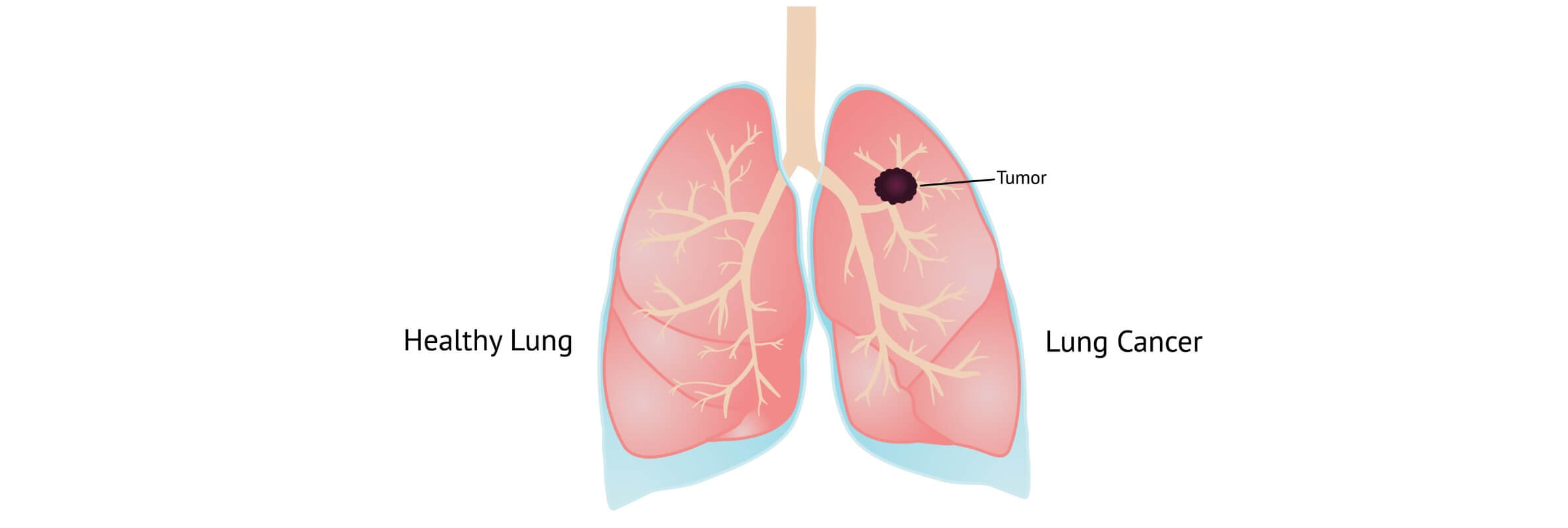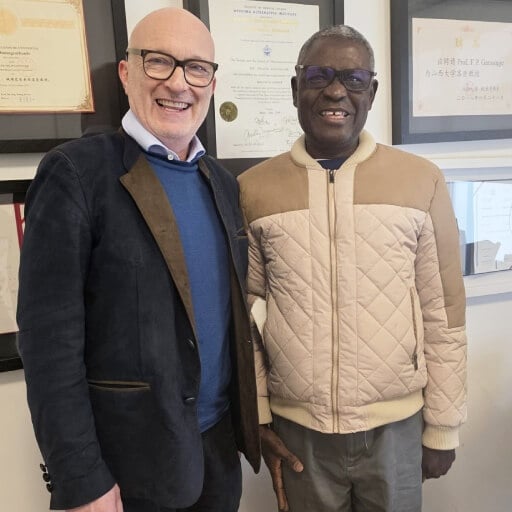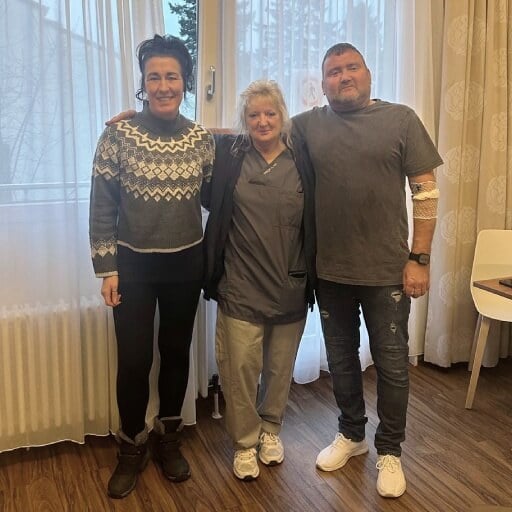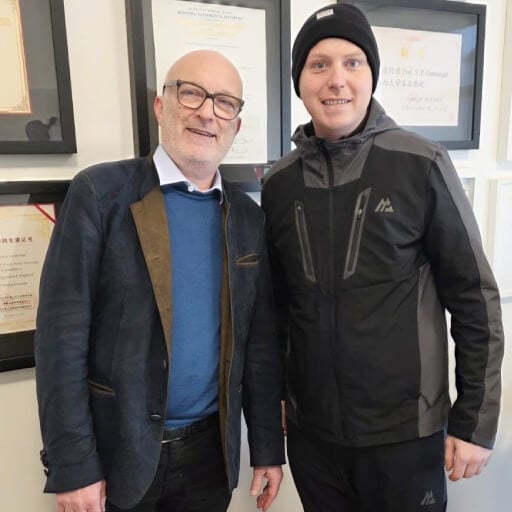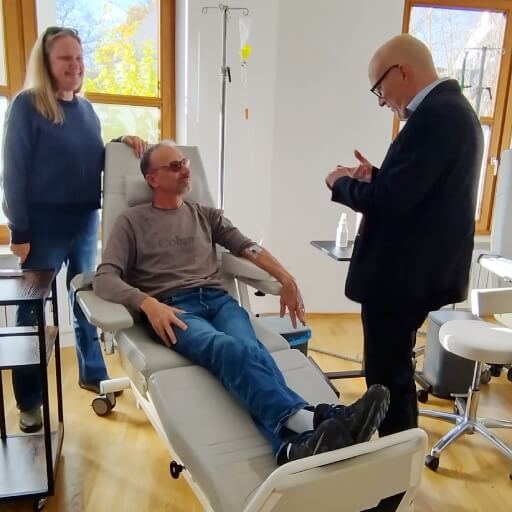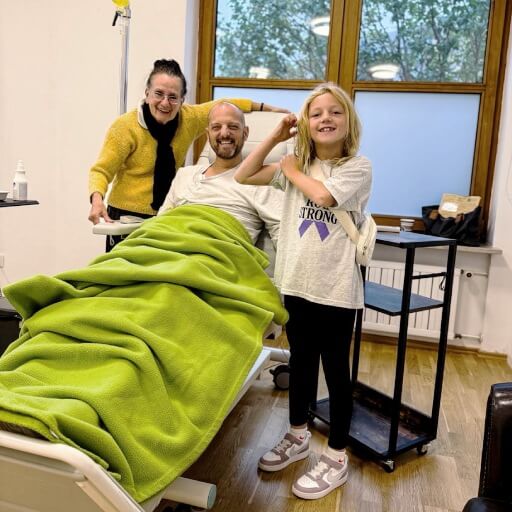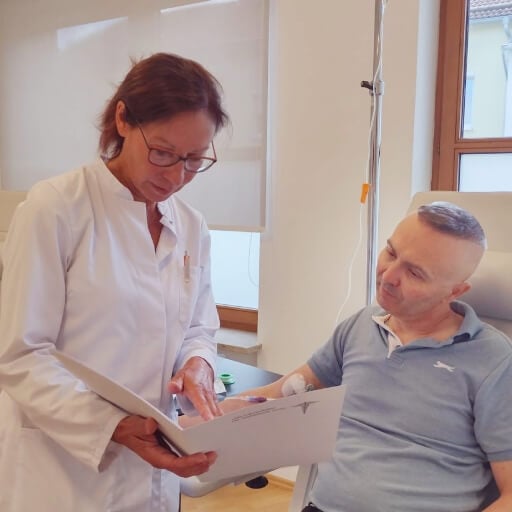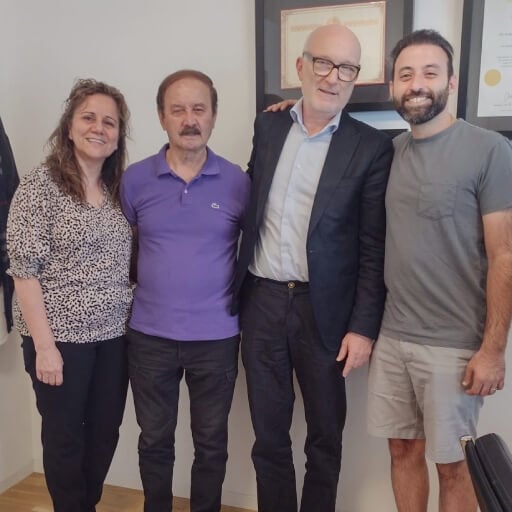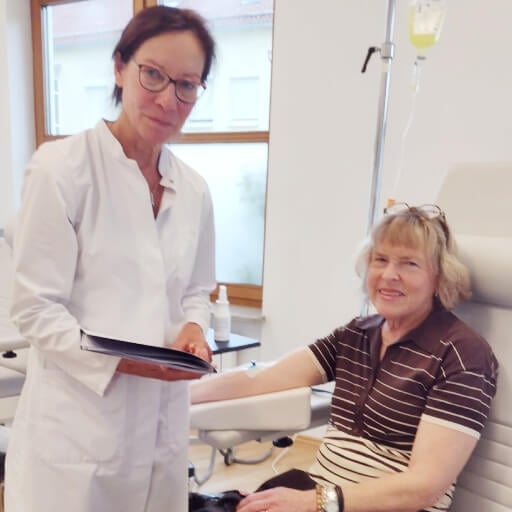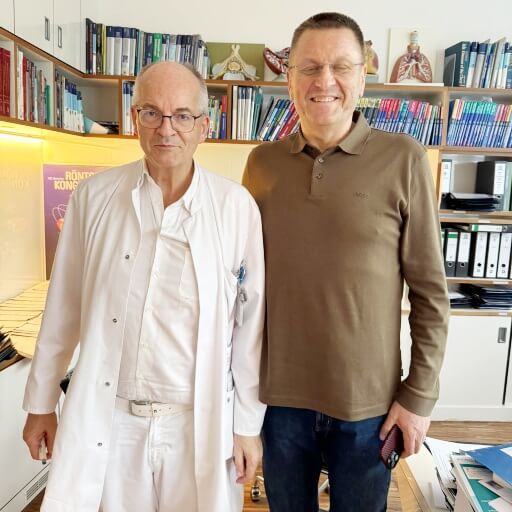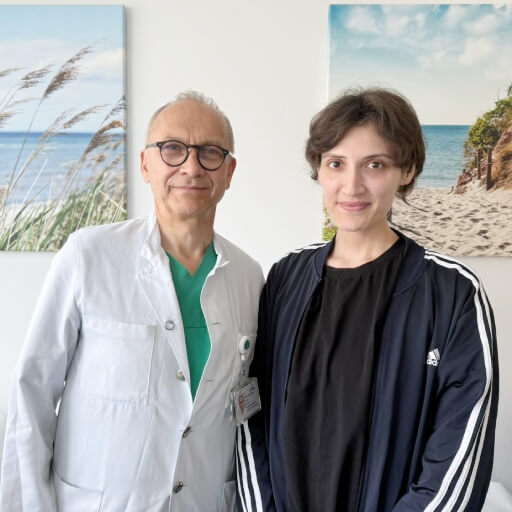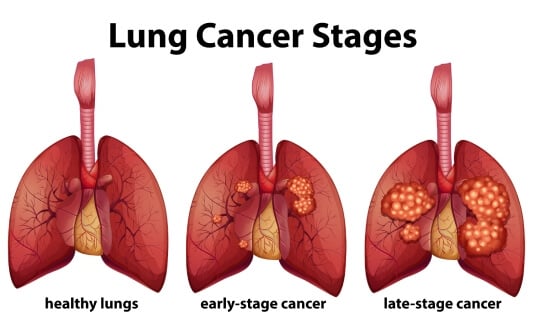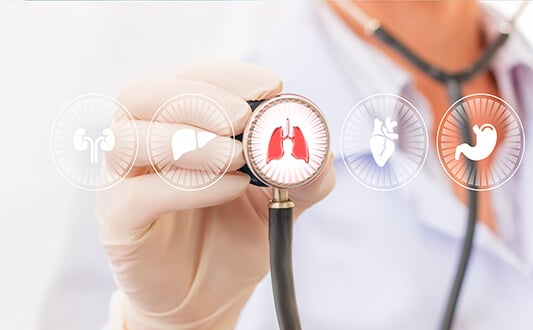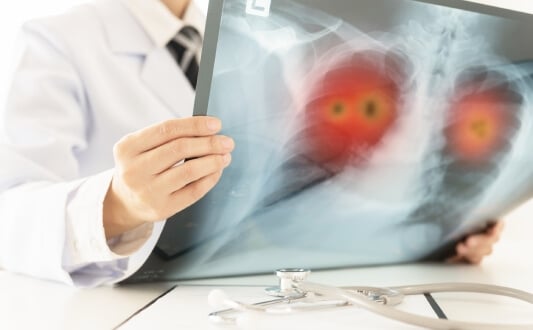Lung cancer is one of the most prevalent and aggressive malignancies globally, significantly impacting public health. According to the German Centre for Cancer Registry Data, there were approximately 56,700 new cases of lung cancer diagnosed in Germany in 2020, with 34,100 cases in men and 22,590 in women [1]. The age-standardized incidence rates were 51.8 per 100,000 for men and 31.4 per 100,000 for women [2]. Lung cancer accounted for 27,751 deaths in men and 17,066 in women, making it the most frequent cancer-related cause of death in men (22.8%) and the second most frequent in women (15.8%) [1].
The prognosis for lung cancer patients varies significantly depending on the stage at diagnosis. The relative 5-year survival rate is approximately 25% for women and 19% for men. Regular screening and early detection are crucial because lung cancer often presents with no symptoms in its initial stages, leading to delayed diagnoses and limited treatment options. [3]
Despite these challenges, Germany has become a leader in lung cancer treatment. The country offers advanced medical infrastructure and a range of lung cancer new treatment options in Germany that continue to improve survival and quality of life. For individuals diagnosed with lung cancer, particularly in advanced stages, seeking treatment in this country provides access to comprehensive care and the latest therapeutic options. With their focus on personalized care and constant medical research, German hospitals offer hope to patients from all over the world.
Standard and Protocol-Based Therapies for Lung Cancer in Germany
Conventional approaches are still the foundation of the treatment of lung cancer in Germany, especially for early and locally advanced stages [4]. Surgical interventions, such as lobectomy, segmentectomy, or complete lung resection (pneumonectomy), are considered the gold standard for operable non-small cell lung cancer (NSCLC). These procedures are often followed by adjuvant chemotherapy or radiotherapy to eliminate any remaining cancer cells and reduce the risk of recurrence. In turn, small cell lung cancer treatment in Germany typically involves systemic therapies like chemotherapy and immunotherapy due to the disease's aggressive nature.
Systemic chemotherapy remains widely used for inoperable cases or as part of a multimodal plan. Radiotherapy, including intensity-modulated techniques, is applied to shrink tumors, manage symptoms, and improve survival. All treatments are closely monitored through PET-CT scans and biomarker analysis to guide decisions during follow-up care.
In Germany, lung cancer treatment also incorporates immunotherapy, which is now increasingly used within official treatment protocols, particularly for advanced or metastatic disease. These therapies involve a group of immune checkpoint inhibitors that help the immune system recognize and attack cancer cells. Combined with other conventional approaches, this ensures both standardization and adaptability in patient care.
Advanced Treatments for Lung Cancer Offered in Germany
Dendritic Cell Therapy for Lung Cancer
Dendritic cell therapy represents a significant advancement in cancer immunotherapy. This treatment involves collecting a patient's dendritic cells, exposing them to tumor-specific antigens in a laboratory setting, and reintroducing them into the patient's body to stimulate a targeted immune response against cancer cells.
The scientific foundation of this therapy was recognized with the 2011 Nobel Prize in Physiology or Medicine awarded to Dr. Ralph Steinman who discovered the critical role of dendritic cells in regulating immune responses [5]. His work paved the way for new cancer treatment strategies that train the immune system to recognize and fight tumors more effectively.
Clinical studies in Germany have demonstrated the efficacy of dendritic cell therapy in treating NSCLC. For example, a study shows that advanced NSCLC patients who completed a full course of dendritic cell therapy saw a 25% increase in 5-year survival rates, compared to the typical 10%. In addition, combining dendritic cell therapy with cytokine-induced killer (CIK) cells extended progression-free survival from 5.2 to 6.9 months in late-stage cases.
Recent protocols often combine dendritic cell therapy with hyperthermia, a technique that gently heats tumor tissues to enhance immune system activity and improve the therapeutic effectiveness of immunotherapy. Hyperthermia has been shown to enhance dendritic cell function and promote better infiltration of immune cells into the tumor microenvironment.
However, it is important to note that the selection of patients for dendritic cell therapy often depends on tumor profiling and biomarkers that help determine likely immune response.
Interventional Radiology for Lung Cancer
Germany offers a wide range of minimally invasive, image-guided procedures through interventional radiology, significantly enhancing treatment options for patients with inoperable or advanced-stage lung cancer. These methods are especially beneficial for those who cannot undergo surgery due to age, comorbidities, or extensive tumor spread.
Radiofrequency Ablation (RFA) uses high-frequency electrical currents to generate heat and destroy cancer cells [6]. It is most effective for small, localized lung tumors. Studies show a primary success rate of about 79.5% and a secondary success rate of 87.5% with re-treatment. For patients with primary lung cancer, 1-, 2-, and 3-year survival rates were reported at 100%, 86%, and 43%, respectively. RFA is typically well tolerated and offers a shorter recovery time than conventional surgery.
Microwave Ablation (MWA) employs microwave energy to heat and kill tumor cells. It is especially useful for larger tumors or those near major blood vessels where other ablation methods may be less effective. Clinical data reports a 1-year survival rate of 81.2%, with a local tumor progression rate of 12.7%. MWA can create larger ablation zones more quickly than RFA, making it a preferred option in specific clinical scenarios.
Cryoablation freezes cancerous tissue, causing cell death while sparing nearby healthy structures. This technique is known for minimal pain during and after the procedure. One study found that cryoablation led to 1- and 3-year survival rates of 91% and 59.6%, respectively. Because of its precision and safety, cryoablation can be repeated if necessary and is often selected for tumors located near sensitive areas.
Electrochemotherapy (ECT) combines low-dose chemotherapy with electrical pulses that increase cell membrane permeability, allowing the drugs to penetrate cancer cells more effectively. ECT has shown promising results in patients with tumors resistant to standard chemotherapy, delivering a complete response rate of 64%, partial response in 22% of patients, and stable disease in 14%. This method is gaining popularity as a less invasive yet potent option for resistant or recurrent lung tumors.

Arterial Embolization (AE), which is often used for palliative care, involves blocking the tumor's blood supply to limit its growth. In patients suffering from hemoptysis (coughing up blood) due to lung cancer, bronchial artery embolization has achieved a technical success rate of 98.8% and clinical success in 82.1% of cases. AE provides fast symptom relief and can significantly improve the quality of life for those with advanced disease.
Electrochemotherapy (ECT): A Cancer Treatment That Doesn't Use Heat, Cold, or Radiation
Transarterial Chemoembolization (TACE) for Lung Cancer
TACE is a minimally invasive procedure that delivers chemotherapy directly to the tumor's blood supply. Embolic agents then block the vessels, effectively starving the tumor of nutrients. This localized approach allows for higher concentrations of chemotherapy agents at the tumor site while minimizing systemic exposure. [7]
In German clinical settings, TACE has been utilized for patients with stage 4 lung cancer, particularly those with liver metastasis. Studies have reported a median survival time of 11 months post-TACE treatment, highlighting its potential as a palliative option for advanced-stage patients.
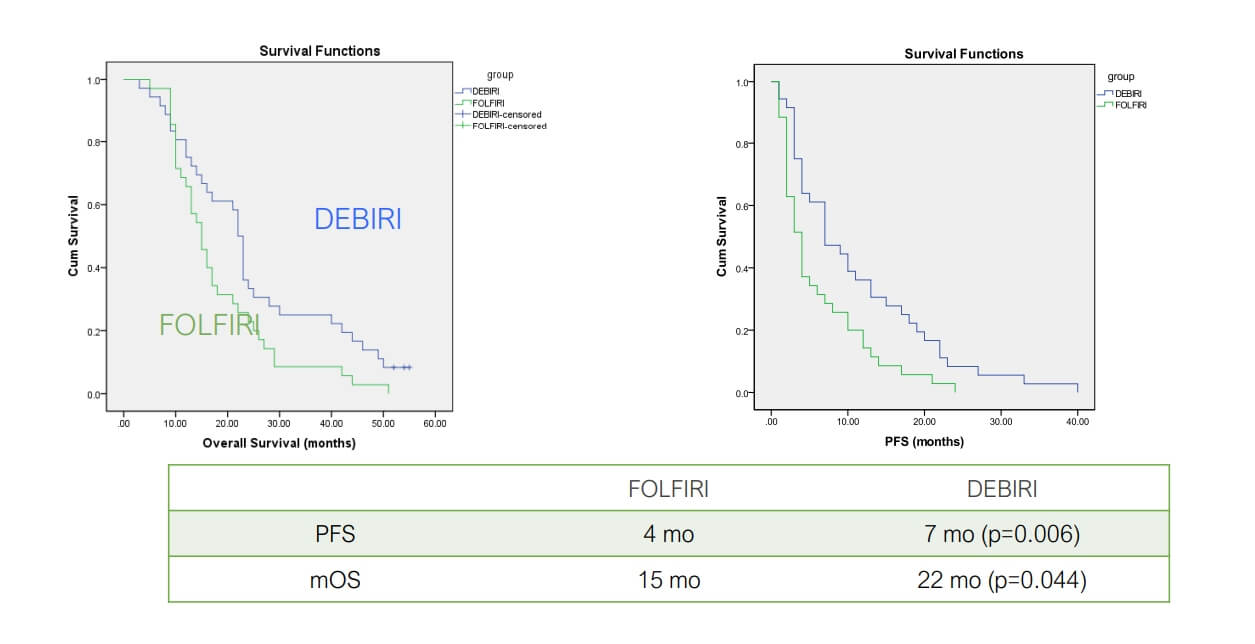
Aliberti C et al Ancancer Res 2011;31:4581
Richardson A et al J Vasc Interv Radiol 2013;24:1209
| Therapy Type | 2-Year Survival Rate | Response Rate | Duration | Side Effects |
|---|---|---|---|---|
| Standard Treatment | ~25% for advanced cancer | < 10% | Multiple cycles | Severe (nausea, fatigue, hair loss, immunosuppression, skin irritation) |
| Innovative Methods | ~60% for advanced cancer | ~45-65% | Up to 4 sessions | Mild (temporary pain or local discomfort) |
*Data based on German clinical results and Booking Health patient statistics
Lung cancer treatment in Germany, clinic prices
| Treatment Methods | Average lung cancer treatment cost in Germany (Full Course) | Availability in Germany |
|---|---|---|
| Standard Treatment | €80,000 - €150,000 | Widely available in major hospitals |
| Innovative Methods | €25,000 - €60,000 | Offered in leading cancer centers |
* Actual lung cancer cost in Germany depends on tumor stage, selected hospitals, and individual treatment plan.
Best Lung Cancer Hospitals in Germany
Germany's healthcare system is known for its rigorous certification processes, particularly in oncology. The German Cancer Society (Deutsche Krebsgesellschaft, DKG) certifies lung cancer centers that meet strict criteria, ensuring high-quality care, multidisciplinary collaboration, and adherence to the latest clinical guidelines.
Below is a selection of some of the best lung cancer hospitals in Germany, recognized for their specialized services and contributions to pulmonology and thoracic oncology:
| Hospital | Location | Highlights |
|---|---|---|
| Asklepios Lung Clinic Gauting | Munich | Largest pulmonary center in Bavaria; certified by the DKG; part of the Comprehensive Pneumology Center (CPC); active in clinical trials. |
| Evangelical Lung Hospital Berlin | Berlin | Certified lung cancer center since 2009; recognized Thoracic Surgery Competence Center; offers comprehensive palliative care. |
| University Hospital of Ludwig Maximilian University of Munich | Munich | University hospital affiliated with Ludwig Maximilian University; integrates advanced research and PET-CT diagnostics; part of the CPC. |
| ViDia Hospital Karlsruhe | Karlsruhe | Academic hospital affiliated with the University of Freiburg; offers modern treatment protocols and multidisciplinary care. |
These hospitals offer the best lung cancer treatment in Germany, providing high-quality care. They use the latest technology and bring together specialists from different fields to create treatment plans tailored to each patient. This approach improves outcomes and gives patients access to some of the most advanced therapies available today.
Lung Cancer Patient Story: Susan Clark Livingston's Experience
When Susan Clark Livingston was first diagnosed with stage 4 lung cancer in the United States, her doctors gave her no more than six months to live. Desperate for alternatives, her daughter Julia found Booking Health and arranged for Susan to undergo innovative treatment for lung cancer in Germany at the LDG Laboratories Dr. Gansauge Berg under the guidance of Professor Gansauge.
The difference was immediate. The German oncology team created a fully personalized therapy plan for Susan that included dendritic cell immunotherapy and close follow-up care. Susan responded exceptionally well. Her tumor stabilized, and her overall well-being improved dramatically.
"Thanks to the brilliance and diligence of Professor Gansauge and Dr. Taubert, my mother has outlived her original diagnosis by a year and a half," Julia shared. "She still goes for morning runs, has a full head of red hair, and looks as radiant as she did in her youth."
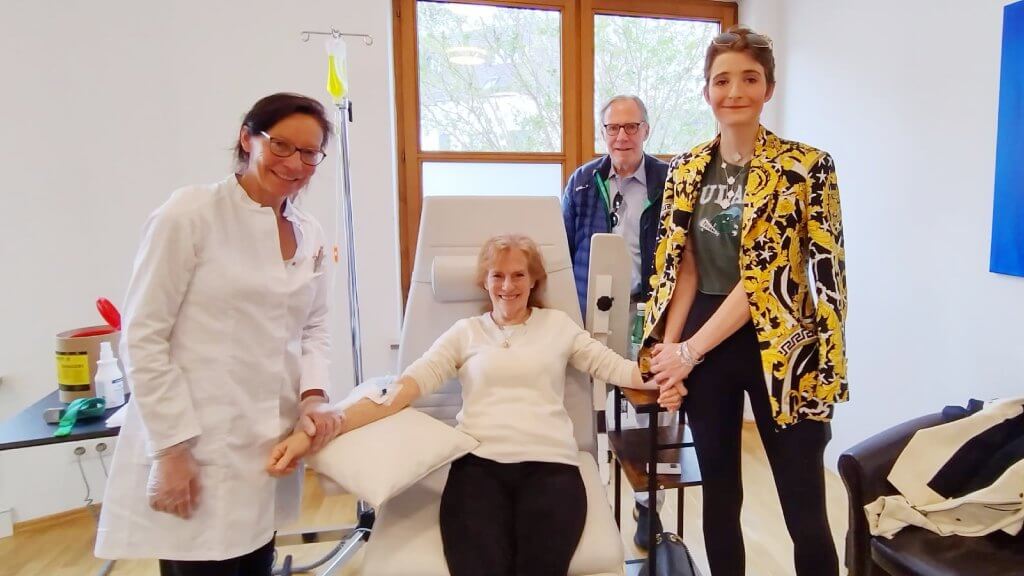
Regain Hope with Advanced Lung Cancer Treatment in Germany
A diagnosis of metastatic lung cancer, especially stage 4, can feel devastating. Patients are often told that "there is little we can do," but thanks to rapid advancements in treatment, 4 stage lung cancer treatment is no longer a dead-end.
Germany leads in advanced cancer care, providing new, proven treatments that improve results for patients. From dendritic cell immunotherapy and TACE to precision-targeted therapy and image-guided interventional radiology, patients now have access to personalized care strategies that were unthinkable a decade ago. These options often involve shorter hospital stays and significantly fewer side effects compared to conventional chemotherapy.
Booking Health works closely with leading cancer centers in Germany to provide access to second opinions, multimodal therapy plans, and continuous monitoring using real-time diagnostics.
If you or your loved one has been diagnosed with advanced lung cancer, know that hope and options still exist. Germany's world-class specialists are ready to help you take the next step forward with science, compassion, and new possibilities.
A Medical Journey: Every Step of the Way With Booking Health
Finding the best treatment strategy for your clinical situation is a challenging task. Being already exhausted from multiple treatment sessions, having consulted numerous specialists, and having tried various therapeutic interventions, you may be lost in all the information given by the doctors. In such a situation, it is easy to choose a first-hand option or to follow standardized therapeutic protocols with a long list of adverse effects instead of selecting highly specialized innovative treatment options.
To make an informed choice and get a personalized cancer management plan, which will be tailored to your specific clinical situation, consult medical experts at Booking Health. Being at the forefront of offering the latest medical innovations for already 12 years, Booking Health possesses solid expertise in creating complex cancer management programs in each individual case. As a reputable company, Booking Health offers personalized lung cancer treatment plans in Germany with direct clinic booking and full support at every stage, from organizational processes to assistance during treatment. We provide:
- Assessment and analysis of medical reports
- Development of the medical care program
- Selection of a suitable treatment location
- Preparation of medical documents and forwarding to a suitable clinic
- Preparatory consultations with clinicians for the development of medical care programs
- Expert advice during the hospital stay
- Follow-up care after the patient returns to their native country after completing the medical care program
- Taking care of formalities as part of the preparation for the medical care program
- Coordination and organization of the patient's stay in a foreign country
- Assistance with visas and tickets
- A personal coordinator and interpreter with 24/7 support
- Transparent budgeting with no hidden costs
Health is an invaluable aspect of our lives. Delegating management of something so fragile yet precious should be done only to experts with proven experience and a reputation. Booking Health is a trustworthy partner who assists you on the way of pursuing stronger health and a better quality of life. Contact our medical consultant to learn more about the possibilities of personalized treatment with innovative methods for lung cancer with leading specialists in this field.
Cancer Treatment Abroad: Patient Experiences with Booking Health
Frequently Asked Questions About Lung Cancer Treatment in Germany
Send request for treatmentThe top options are the Asklepios Lung Clinic Gauting, the Evangelical Lung Hospital Berlin, the University Hospital of Ludwig Maximilian University of Munich, and the ViDia Hospital Karlsruhe. All of these facilities are recognized for their excellence in thoracic oncology and pulmonology.
Options include surgery, chemotherapy, radiotherapy, immunotherapy, targeted therapy, and interventional radiology techniques like TACE.
Yes. Most certified clinics in Germany offer immunotherapy, including checkpoint inhibitors and dendritic cell therapy.
Cost varies by clinic and treatment plan. Booking Health helps reduce expenses through direct contracts, with savings up to 50%.
Although success depends on the type and stage of the cancer, Germany's focus on personalized, multimodal care improves survival rates and quality of life.
Yes, Booking Health can coordinate a second opinion with top German specialists.
Innovations include robotic surgery, PET-CT diagnostics, TACE, dendritic therapy, and molecular profiling.
Standard treatment costs €80,000-€150,000. Innovative methods – €25,000-€60,000. In addition, novel methods typically require fewer visits to the healthcare facility and offer better efficacy and quality of life.
About 25% with standard treatment and up to 60% with innovative: these are general numbers to consider, while each case is individual.
Below 10% for standard therapy and 45-65% for innovative – all are variable in individual patients.
Standard therapy lasts several months. Innovative methods – up to 4 sessions.
Standard therapy causes severe side effects. Innovative methods – mild, short-term reactions.
These are Asklepios Lung Clinic Gauting, Evangelical Lung Hospital Berlin, University Hospital LMU Munich, and ViDia Hospital Karlsruhe. You can see the full list of hospitals and select the best one for you on the Booking Health website.
Costs vary by clinic and treatment plan, but Booking Health helps reduce expenses through direct contracts with hospitals. On average, patients save up to 50% on treatment while gaining access to the best hospitals with no hidden fees or extended wait times.
The best treatment for lung cancer depends on stage, tumor biology and patient condition. In Germany standard therapies are often complemented by interventional radiology and dendritic cell therapy – allowing better disease control in selected patients.
Choose treatment abroad and you will for sure get the best results!
Authors:
This article was edited by medical experts, board-certified doctors Dr. Nadezhda Ivanisova, and Dr. Bohdan Mykhalniuk. For the treatment of the conditions referred to in the article, you must consult a doctor; the information in the article is not intended for self-medication!
Our editorial policy, which details our commitment to accuracy and transparency, is available here. Click this link to review our policies.
Sources:
[1] Cancer in Germany 2019/2020. 3.12 Lung.
[2] The Robert Koch Institute is a Federal Institute within the portfolio of the Federal Ministry of Health. Lung cancer. https://www.krebsdaten.de/Krebs/EN/Content/Cancer_sites/Lung_cancer/lung_cancer_node.html
[3] American Cancer Society. Can Lung Cancer Be Found Early? https://www.cancer.org/cancer/types/lung-cancer/detection-diagnosis-staging/detection.html
[4] PubMed Central. Lung cancer: biology and treatment options. https://pmc.ncbi.nlm.nih.gov/articles/PMC4663145/
[5] PubMed. The 2011 Nobel Prize in physiology or medicine. https://pubmed.ncbi.nlm.nih.gov/22053831/
[6] American Cancer Society. Radiofrequency Ablation (RFA) for Non-Small Cell Lung Cancer. https://www.cancer.org/cancer/types/lung-cancer/treating-non-small-cell/radiofrequency-ablation.html
[7] PubMed Central. Regional Chemotherapy of the Lung: Transpulmonary Chemoembolization in Malignant Lung Tumors. https://pmc.ncbi.nlm.nih.gov/articles/PMC3709942/
Read:
Treatment of stage 4 lung cancer in Germany
Article menu:
- Standard and Protocol-Based Therapies for Lung Cancer in Germany
- Advanced Treatments for Lung Cancer Offered in Germany
- Transarterial Chemoembolization (TACE) for Lung Cancer
- Comparative Outcomes: Standard vs. Innovative Lung Cancer Treatments in Germany
- Best Lung Cancer Hospitals in Germany
- Lung Cancer Patient Story: Susan Clark Livingston's Experience
- Regain Hope with Advanced Lung Cancer Treatment in Germany
- Frequently Asked Questions About Lung Cancer Treatment in Germany
- A Medical Journey: Every Step of the Way With Booking Health
Don't know where to start?
Contact Booking Health